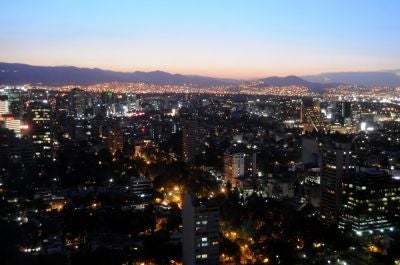Your support helps us to tell the story
From reproductive rights to climate change to Big Tech, The Independent is on the ground when the story is developing. Whether it's investigating the financials of Elon Musk's pro-Trump PAC or producing our latest documentary, 'The A Word', which shines a light on the American women fighting for reproductive rights, we know how important it is to parse out the facts from the messaging.
At such a critical moment in US history, we need reporters on the ground. Your donation allows us to keep sending journalists to speak to both sides of the story.
The Independent is trusted by Americans across the entire political spectrum. And unlike many other quality news outlets, we choose not to lock Americans out of our reporting and analysis with paywalls. We believe quality journalism should be available to everyone, paid for by those who can afford it.
Your support makes all the difference.Mayors from around the world signed a voluntary pact Sunday in Mexico City to reduce greenhouse gas emissions at a meeting meant as a precursor to UN-sponsored climate talks in Cancun opening next week.
The gathering in one of the world's most polluted cities assembled thousands of local and regional leaders to discuss a wide range of economic and social issues, including climate change.
Participants from some 135 cities and urban areas - including Buenos Aires, Bogota, Johannesburg, Los Angeles, Paris and Vancouver - signed the pact which states their intention to adopt a slate of measures to stem climate change.
Each city "will have to register its climate data (commitments as well as performance) in the city climate record" during the next eight months, said Gabriel Sanchez, president of Think Foundation, a Mexican non-profit.
Residents will be able to track their cities' performance online, officials said.
The pact will be presented at UN talks in the Mexican resort of Cancun from November 29 to December 10.
That's when top climate scientists from around the world hope to break the deadlock on reducing greenhouse-gas emissions and channeling aid to poor, vulnerable countries after the widely regarded failure of the last climate summit, in Copenhagen.
Sunday's signing came a day after the close of the third conference of the United Cities and Local Governments, attended by mayors, legislators and officials from more than 1,000 cities and towns in 114 countries.
Mexico City Mayor Marcelo Ebrard said his counterparts should seize the opportunity ahead of Cancun to highlight their key roles in the fight to put the brakes on climate change.
"We have to tell the international community that it's in the cities that the battle to slow global warming will be won," Ebrard said in the lead-up to the meeting.
And he has brought the battle to his doorstep; the leftist Ebrard pledged last week that Mexico City, with its teeming population of more than 20 million, would reduce its annual greenhouse gas emissions by around 14 percent.
The mayors emphasized the vital role that cities, where more than half the world's population now live, can play in the fight against climate change.
Urban areas consume up to 80 percent of global energy production and emit 60 percent of greenhouse gases, according to Christiana Figueres, head of the UN Framework Convention on Climate Change.
The pact sent a "clear signal" to countries that will sit at the negotiating table in Cancun that it is possible to reach agreement, Figueres said.
Meanwhile, a new study released on Sunday found that fossil-fuel gases edged back less than hoped in 2009, as falls in advanced economies were largely outweighed by rises in China and India.
Annual global emissions of carbon dioxide (CO2) from the burning of oil, gas and coal were 30.8 billion tonnes, a retreat of only 1.3 percent in 2009 compared with 2008, a record year, they said in a letter to the journal Nature Geoscience.
The decrease was less than half what had been expected, because emerging giant economies were unaffected by the downturn that hit many large industrialized nations.
In addition, they burned more coal, the biggest source of fossil-fuel carbon, while their economies struggled with a higher "carbon intensity," a measure of fuel-efficiency.
Emissions of fossil-fuel gases in 2009 fell by 11.8 percent in Japan, by 6.9 percent in the United States, by 8.6 percent in Britain, by 7.0 percent in Germany and by 8.4 percent in Russia, the paper said.
In contrast, they rose by eight percent in China, the world's number one emitter of fossil-fuel CO2, which accounts for a whopping 24 percent of the total.

Join our commenting forum
Join thought-provoking conversations, follow other Independent readers and see their replies
Comments